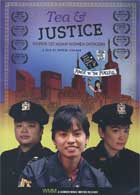
Tea & Justice: The Life and Times of NYPD’s 1st Asian Women Officers 2010
Distributed by Women Make Movies, 462 Broadway, New York, NY 10013; 212-925-0606
Produced by Ermena Vinluan
Directed by Ermena Vinluan
DVD, color, 55 min.
Jr. High - Adult
Asian American Studies, Criminal Justice, Women's Studies
Date Entered: 10/21/2010
Reviewed by Patricia B. McGee, Coordinator of Media Services, Volpe Library & Media Center, Tennessee Technological University“Image is a powerful force. What is in the eye of the beholder?” Ermena Vinluan “wanted to explore images of everyday reality, images of those who look like me.” She chose as her subjects three Asian-American women who had chosen careers in law enforcement. She had conflicted feelings about her project, since Vinluan herself had had a difficult experience when she was involved in a political protest demonstration.
Why did they choose law enforcement? Trish Ormsby, a Japanese-American raised in a very traditional family, went to work right out of high school for a Wall Street firm. She worked her way up to a prestigious associate position in a Japanese company, but in the absence of her secretary she was forced to serve tea to the male associates. She served her last tea and found a new career in the police department. Agnes Chan was encouraged to consider police work by a professor who pointed out that the Chinese community was suspicious of the police establishment. Christine Leung took the police exam on a whim and found police salaries to be significantly higher than what she was earning as a corporate secretary.
All three officers had difficulty telling their families of their decision to join the police force. All had to learn to be assertive and cope with sexism and racism, and break through the barriers of the “boys club.” Agnes Chan, the first Asian female officer had a patrol partner who refused to speak to her until she told him she was the Asian American woman who scored 98 on the test and was not part of a quota.
Tea & Justice is as much the story of the director’s exploration of her attitudes toward Asian American police women as it is the story of the women themselves. She follows their stories as they grow as law enforcement officers, as they interact with people of color, and as they police political demonstrations. She comes to understand how women bring a particular sensibility to policing. Vinluan wonders if her experience as a protest demonstrator would have been different had she been arrested by a female officer.
A mix of documentary footage, family photos and clever graphics, and with a thoughtful narrative by Margie Moore, Director of the National Center for Women & Policing, Tea & Justice is a profoundly moving story of three extraordinarily brave, pioneering women.